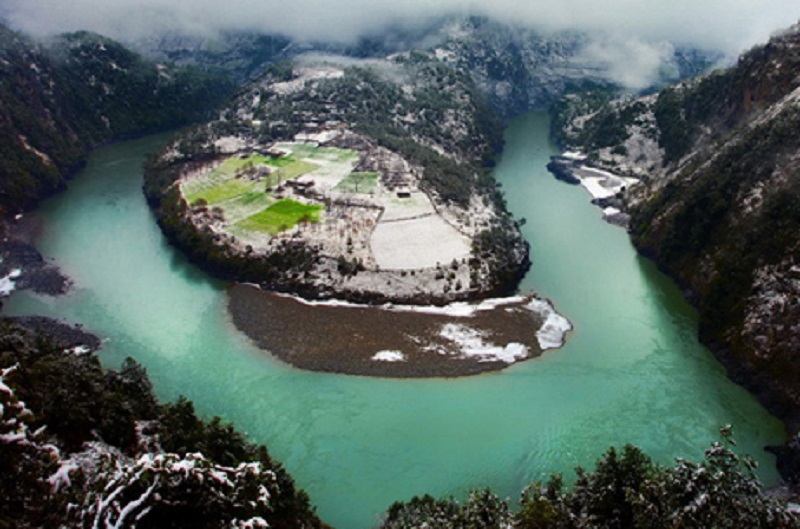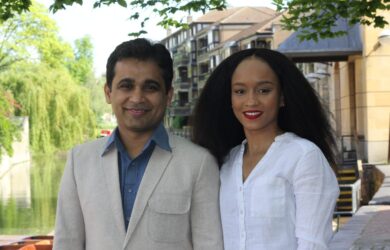
Songqiao Yao begins her MPhil this autumn and hopes to build on years of river advocacy work and the research she has been doing in the last few months on the Nu River valley.
Songqiao Yao [2014] came to environmental issues via an interest in community service, education and women's rights. This broad-based interest has had an impact on the way she tackles environmental concerns. For the last few years she has been working on river advocacy in China, but recently has chosen to focus more on how the ecology of rivers fits with the changing human dynamics along their course.
She says: “In the past people have seen rivers from a utilitarian point of view for what they can do for humans. However, there are bigger ecological questions which embrace social changes such as urbanisation and economic growth and the deteriorating environment. I want to develop a more broad, holistic way of approaching the subject which gives a more comprehensive view of the situation.”
She begins her MPhil in Geographical Research at the University of Cambridge in the autumn and hopes to build on the research she has been doing in the last few months on the Nu River valley.
Study abroad
Songqiao was born in Dongying in the coastal province of Shandong, but went to high school in Shanghai. Songqiao was sent to advanced physics and maths classes at high school, but was more interested in the arts. The summer after her first year at high school she went on a school trip to the US. It was her first time abroad. Her English was good so she could ask lots of questions about the US university system. She liked the fact that she did not have to know what she wanted to study when she started and that she could study a broad range of the liberal arts. “I felt like the US system was more flexible and fit me better,” she says.
She had no-one to advise her, though. Indeed she was one of only seven students in her year group of 600 who chose to do her undergraduate degree abroad. She wrote to many US universities’ admissions offices. Mount Holyoke College was the first to respond to her email. An admissions officer was in Shanghai at the time and told her about the generous scholarships the college offered. Songqiao applied and began a degree majoring in critical social thought.
She had always been interested in voluntary work and had started a student organisation in high school which focused on community work. While she was at Mount Holyoke she spent the first summer teaching in a rural part of China. The second summer was spent working for the Global Fund for Women on women’s rights and in her third year she went to Germany where she interned for a think tank called German Watch which took part in the UN Convention on Climate Change. She says: “Climate change is an area which impacts everyone. My interests up till then had been education and gender which some see as minority issues, but climate change is a bigger movement with a bigger momentum.”
International Rivers
Songqiao graduated from Mount Holyoke College in 2011 and started working for the International Rivers organisation in their Berkeley office in California. She was focusing on global issues, but the organisation wanted to hire a Chinese consultant. Her manager told her to apply. Despite only just being out of college, she got the job because she knew the organisation and they trusted her. She set up the China office in Beijing with the director of the China programme. “Most of the partners we were interacting with were twice my age,” she says, adding that she faced a steep learning curve. A lot of the work involved complicated diplomacy, for instance, work on the Mekong River required her to cooperate with communities and activists in the six countries the river runs through. She had to learn how to gradually build a movement. “As a young person I was quite impatient. The first year I wanted to make things happen, but I realised it takes time to make the connections I needed to build the necessary change,” she says.
She travelled extensively in China to visit different rivers and profile them. Chinese NGOs had done similar work, but this was the first time it was done in a systematic way. Some of the information she needed was not always accessible.”It was a big challenge,” she says. The work involved building connections with partners along the rivers to investigate the human impact on the environment and sustainable growth. “It was at a time when people were worried about air pollution and were beginning to realise the importance of the environment,” says Songqiao.
In 2012, Songqiao played a key role in the publication of a report, The Last Report on China’s Rivers, which drew a lot of media attention. “It was like a eulogy for China’s rivers and a call to action,” says Songqiao. The report was supported by 19 organisations and many respected authors and consolidated over 10 year’s of river advocacy work in China. Representatives from different government ministries were interested to discuss it. Since then other NGOs have committed to bringing out an annual report on the state of China’s rivers and to organising an annual campaign.
Local focus
After working at the national level, Songqiao became interested in developing a more local focus which took into account local minority cultures and ecological conservation. She won support from the Global Explorer Fund from National Geographic to study the Nu River valley. She is now writing up her report and a local NGO she has been working with will continue her research. She hopes to set up an exhibition in Beijing on her research to get a general audience to see it.
She will incorporate her Nu River research into her MPhil, focusing on sustainable development more broadly and in other parts of the world. At Cambridge, she will be based in the Department of Geography which she feels will be more interdisciplinary. “People say China is unique, but I am not sure it is unique. I want to shift my perspective and look at other emerging economies and wider issues,” she says.
In the months leading up to arriving in Cambridge, she has been working on a social enterprise start-up with friends. The company sells fresh organic juice and works with a local farmers market and organic farms. It is not a physical store, but runs from a website and through social media. All the waste and packaging can be recycled. The company is also commited to an ethical recruitment policy, hiring women from rural areas to work with them. Songqiao hopes to continue to keep in touch with the project while she is in Cambridge and to research other innovative ideas. “I’m excited to learn about new models, to explore the private sector, to learn business skills and to still be connected with the environment,” she says.
Picture credit: Wiki Commons and Claire Liy.












